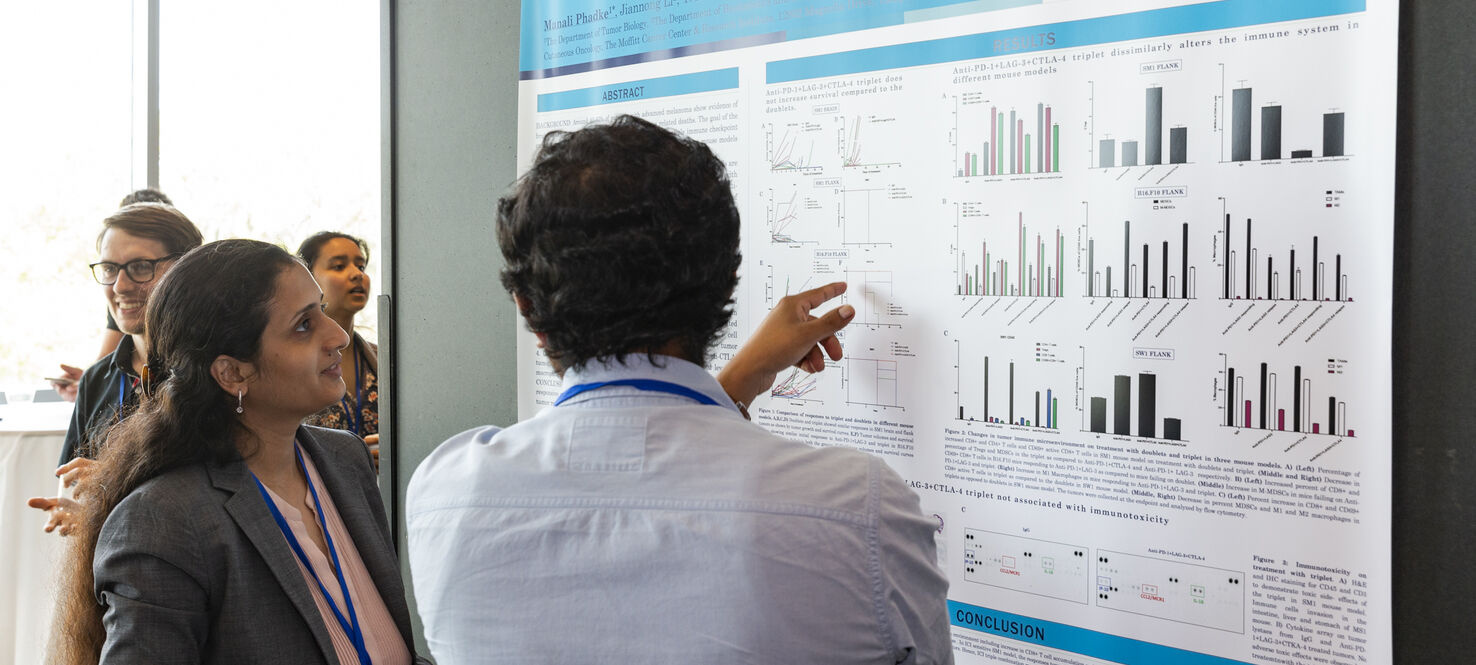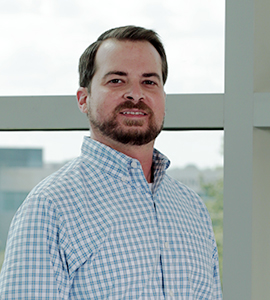Next Generation Research Highlighted at Moffitt Scientific Symposium
Moffitt Cancer Center is dedicated to preventing and curing cancer, which includes training the next generation of scientists and doctors. The cancer center educates more research and oncology trainees than any other institution in Florida.
Each year, Moffitt’s Graduate Medical Education and Research Education and Training departments organize the Scientific Symposium, which allows trainees to submit and present scientific abstracts similar to what is done at major medical conferences. The goal is to give them experience in abstract writing and presenting research.
This year’s event featured more than 200 posters. Here’s some of the research that was highlighted:
A Cancer Resistant Mammal?
Animals outside of the usually studied rat, mice and worm models are becoming increasingly important in human disease research, such as cancer, as they often display unusual biological features. Naked mole rats are one of the most popular nontraditional animal models in cancer research today. Native to Eastern Africa, naked mole rats display an exceptionally long lifespan (30+ years) yet have been observed to display a low incidence of cancer, making them excellent candidates for understanding cancer resistance mechanisms originating within cells.
Moffitt postdoctoral fellows Alyssa Shepard, PhD, and Daniel Lester, PhD, are studying the unique biological mechanisms of the naked mole rat involving genome stability, protein stability, metabolism and other cellular mechanisms such as cell cycle regulation. The study aims to summarize the many identified cancer resistance mechanisms to understand some of the main hypotheses that have been generated.
At yesterday's #MoffittScientificSymposium @USouthFlorida, I joined postdoctoral fellows Alyssa Shepard and Daniel Lester to discuss their work studying cancer resistance in naked mole rats. @catsnlabcoats @LabKissil @MoffittNews pic.twitter.com/Fh4qJmgpmJ
— Dr. Patrick Hwu (@PatrickHwuMD) May 9, 2024
Can ChatGPT Offer Accurate Advice on Breast Cancer Symptoms?
ChatGPT has become a go-to for information, including how to manage health symptoms. While ChatGPT can be useful to learn about certain conditions or symptoms, experts warn that the technology can provide false information or lead to incorrect diagnoses.
Clifton Byrd, MD, a fellow in Moffitt’s Breast Imaging Program, is exploring common uses of natural language artificial intelligence in breast cancer symptoms queries, specifically acute symptoms. He found that ChatGPT generally provided appropriate responses to common questions about breast symptoms, whether phrased medically or in layman’s terms. In some instances, ChatGPT successfully recommended correct actions for most inquiries, although it inaccurately advised against mammograms during pregnancy, misunderstanding them as unsafe rather than simply not the first choice for imaging.
Overall, ChatGPT was effective in giving advice for acute breast symptoms, indicating its potential usefulness for patients seeking online health guidance. Looking ahead, Byrd sees a promising future of AI in medical diagnoses. Continued research and development in AI-driven medical technologies are essential to fully unlock its potential.
During yesterday's #MoffittScientificSymposium, I joined Dr. Clif Byrd for a discussion about his research evaluating the appropriateness of acute breast symptom recommendations provided by ChatGPT. @MoffittNews @DanaAtayaMD pic.twitter.com/SgXBHnQ0jc
— Dr. Patrick Hwu (@PatrickHwuMD) May 9, 2024
To Control or To Treat the Cancer?
Adaptive therapy is a treatment strategy for cancer that involves understanding and utilizing the competition between different types of cancer cells in a tumor. In this approach, some cancer cells are sensitive to drugs and others are resistant. Instead of trying to kill all the cancer cells with high doses of drugs continuously, adaptive therapy allows some of the drug-sensitive cells to remain alive.
Jill Gallaher, PhD, is working on the development of a combination of mathematical models that examines interactions between drug-sensitive and resistant cells to facilitate melanoma adaptive therapy dosing and switch time points among four different therapies. Overall, the goal is to personalize cancer treatment to be more effective and reduce side effects and drug resistance.
Using detailed photographs of the skin cancer over time, Gallaher developed a special method to analyze these photos and quantify changes in the cancer’s appearance, helping to understand how well the treatment is working.
One challenge is that the same treatment might not work the same way on different tumors in the same patient. Gallaher’s goal is to find a way to control all tumors in a patient effectively.
Jill Gallaher, PhD (@jillagal) presents a mathematical model-driven adaptive therapy in advanced basal cell carcinoma at the #MoffittScientificSymposium. pic.twitter.com/cXTDcOHv2R
— Moffitt Cancer Center (@MoffittNews) May 8, 2024



